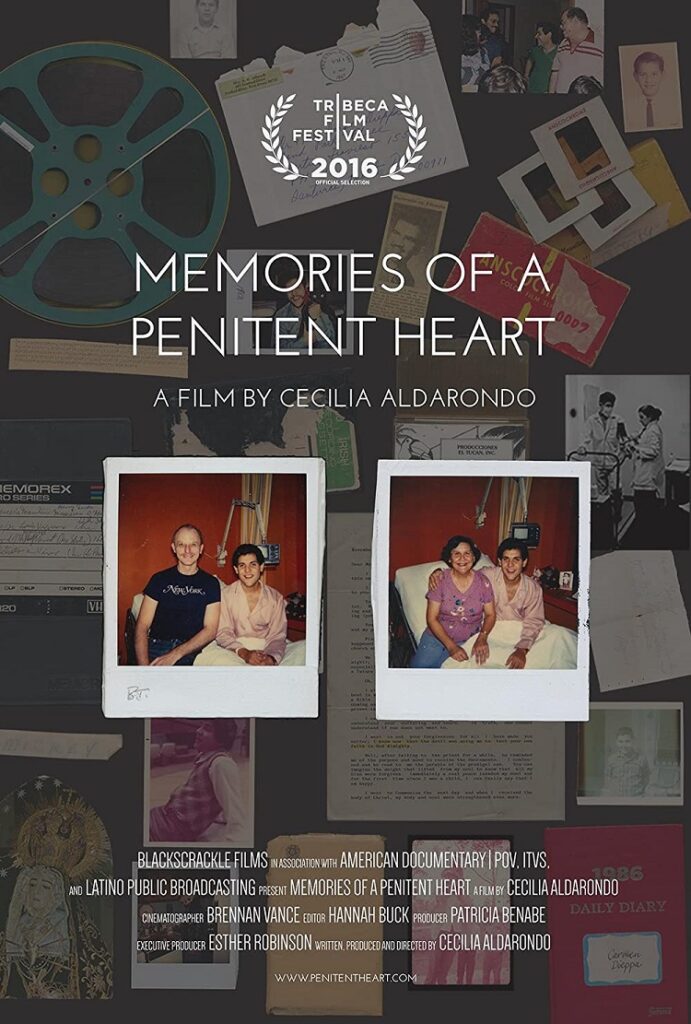
Written by Kristen Lopez
Blood is thicker than water is a common adage trotted out in order to emphasize the unbreakable bonds of family. Our family, in theory, should be comprised of the people who know us best and, conversely, whom we know as well as ourselves. Director Cecilia Aldarondo questions familial authenticity in the gripping documentary Memories a Penitent Heart. Turning the camera inward, Aldarondo explores her own family and identity through investigating her deceased uncle. Comparisons to Sarah Polley’s Stories We Tell abound, but Aldarondo tackles something beyond just her insular family world, casting a net which comprises the religious and cultural attitudes between America and Puerto Rico.
“If we only remember the good things about the people we love, what do we lose?” Cecilia Aldarondo’s uncle, Miguel was a talented playwright who presumably died of cancer. Or so she’d been told. In documenting Miguel’s life Cecilia stumbles upon a secondary world her uncle inhabited, one at odds with his staunch Catholic upbringing.
Familial documentaries hold a special place in my heart. Too often the “dark side” of a seemingly happy family is exposed, but in Aldarondo’s case she simply desires the ability to tell the story of a man who, too often, bottled up who he really was. “Who did Miguel want to be,” Aldarondo asks. Because the dead can’t speak, much like the snapshots of smiling family members gracing her relatives’ walls, we’re giving snapshots in the hopes of creating a portrait of Miguel. No one, despite their proud declarations that they knew the real Miguel, can, with consistency, state something about him. In a round Robin series of interviews everyone – Miguel’s sister, relatives and friends – disagree on whether he did drugs, what he wore in his daily life. Even his name is disputed – he called himself Michael with his friends.
At the core there are questions of whether Miguel’s secrecy stemmed from animosity with his family. Aldarondo hits hardest when the camera is turned inward, away from Miguel’s lover and friends and towards Aldarondo’s own mother and grandmother. Just as Miguel’s words and feelings are glimpsed only in snatches, his mother – Aldarondo’s grandmother – can only be seen as the devout disciple she is.
Contextualizing the barrier Puerto Ricans overcome – living in a nation that “takes refuge in the church” but desperate to be American – Aldarondo hypothesizes that much of Miguel’s troubles, and his mother’s distaste for his lifestyle, have their roots in their homeland. How can one live as they wish when, from childhood, they’ve been told the wrong road can lead them to a life of damnation? Religion as an organization becomes more god-like than the savior for Aldarondo, overseeing and dictating how everyone has lived up to the point the camera captured them. The penitent hearts Aldarondo explores all have shame for different reasons, whether it’s being gay or simply being selfish enough to not realize cries of help and inherent bigotry. With both sides, Miguel’s friends and family, refusing to acknowledge their own faults and flaws in their storytelling, the audience is left wondering if we’re given any truth or simply a rationalization for a person who remains an enigma.
As a documentarian Aldarondo has a flair for mixing popular culture, religion, and a cast of colorful characters into her work, weaving a tapestry for the audience to engage in. Her usage of film clips do seem a bit on the nose at times, and she acknowledges that the confrontation between her mother and Miguel’s lover – what much of the film leads up to – feels “staged” but these are minor quibbles in a documentary that showcases a bright new voice.
Memories of a Penitent Heart captures the interest of fans interested in family dynamics on-stage and the fragmented lives of people we’ll only know as smiling images. In the vein of the aforementioned Stories We Tell or Finding Vivian Maier, Cecilia Aldarondo goes down the rabbit hole to end up in a story that plays like Finding Your Roots with a dash of Catholic guilt. A heart wrenching story of familial flaws and the mythologizing of people deceased, there’s enough memories and heart to entice you.